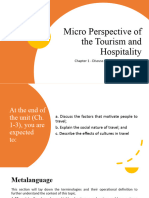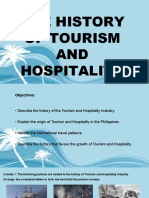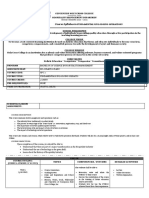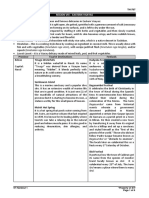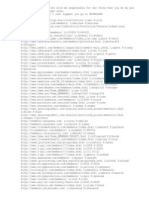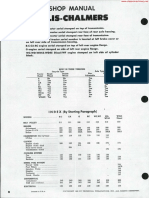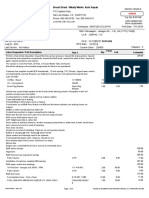Module 2 Lesson 1
Uploaded by
jaydaman08Module 2 Lesson 1
Uploaded by
jaydaman08MODULE 2
The Bare Essentials
LEARNING OUTCOMES:
At the end of this Lesson you are expected to do
the following:
L.O 1 – discuss the two major players in the industry;
L.O 2 – identify and explain the interrelationship of various
departments in the hotel;
L.O 3 – discuss the hotel operating cycle essential in prioritizing
tasks.
L.O 4 – describe the revenue and cost centers of hotels;
L.O 5 – enumerate various rooms in the hotels essential in performing
reservations for the hotel; and
L.O 6 – present an overview of the job positions in a hotel through an
organizational chart.
HPC 2 – Fundamentals of Lodging Operations 1
What Do You Need To Know?
Lesson 1 – The Global Hotelier
Figure 2.1 Venetian Hotel and Casino, Macau
THE GLOBAL HOTELIER
A global hotelier knows how to meet the growing demands of tourists and
are increasingly aware of the skills and attitudes they need to develop to be
abreast with the market trends.
It is necessary that students know the global demands of tourists so they
can identify and bridge gaps in the hotel and resort industry. As students realize
these gaps, they will be able to formulate actions plans that include
interconnecting skills as well as addressing behavioral gaps. Bridging gaps, of
course, entails time. Thus students should start early in preparing themselves
for a rewarding career in the hotel and resort industry.
With the world market leaning towards competency-based management,
future hoteliers can only go up the corporate ladder if they constantly improve
on the skills needed in their job.
HPC 2 – Fundamentals of Lodging Operations 2
BASIC COMPETENCIES OF GLOBAL HOTELIERS:
The global hotelier is perceived as a person who has the following basic
competencies:
1. Self-management Competency
Global hotelier should have a sense of self-
awareness and development. They should be
responsible for their role in the hotel and should
take conscious effort in having their career and
personal advancement.
2. Communication Competency
Global hoteliers must be able to communicate
effectively with their teammates and most especially
with their guests. Since international hotels have
international guests, global hoteliers should be
adept in communicating with foreigners and must
be able to speak foreign languages,
3. Multi-cultural Competency
Global hoteliers must be able to work in a
multicultural environment. They should be able to
understand different cultural, political, and
economic situations for them to relate well with
colleagues and guests alike.
4. Teamwork Competency
Global hoteliers are team players. They
promote a healthy environment that encourage
cooperation and give and take relationships.
Teamwork competency requires collaboration and
information sharing among employees to avoid
confusion.
HPC 2 – Fundamentals of Lodging Operations 3
COMPETENCIES OF MANAGERS
Managers need to have more than basic competencies for them to be successful
in their daily tasks. They should possess the following:
1. Human Relations Competency- coach, counsel, and facilitate the learning
of their staff.
2. Strategic Competency- having underlying knowledge and understanding of
the organization and the industry and providing strategic action.
THE GLOBAL TRAVELER (TOURIST)
The global traveler in the 21st century is changing. Competition in hotel and
resort industry is fierce and hotels are now proactive in knowing what their
guest want.
The population of global travelers grows yearly due to the increasing global
relations among nations.
CHARACTERISTICS OF A GLOBAL TRAVELER:
1) Technology Driven - can use gadgets and equipment that can efficiently fast
track daily transactions.
2) Budget Conscious - they now understand what they want. They choose
hotels through internet reviews and blogs.
3) Detail Oriented - Guest know what they want – pampering and a smooth
check in and check out.
4) Youthful Travelers - the power of the youth cannot be undermined as this
demographic will continue to grow. As the era of baby boomers is at its
decline, more generations Y and X can be seen traveling.
PRODUCT KNOWLEDGE:
Product Knowledge refers to the basic product and services offered by
the hotel. This may include the total number of rooms, inside and outside
facilities and services, amenities provided, rates, vision, mission, and sister
properties of the hotel.
HPC 2 – Fundamentals of Lodging Operations 4
Basic product knowledge includes revenue and cost centers, the hotel
operating cycle and guest room type
Figure 2.2 Hotel Lobby, Diamond Hotel Philippines
HOTEL DEPARTMENT: REVENUE AND COST CENTERS
Revenue Centers are the income-generating departments of the hotel. They
usually have direct hotel guest contact and are called “Front of the House”
1. Rooms Department –
comprises the front
office and
housekeeping team.
2. Food and Beverage
Department –
comprises the outlets,
room service and
banquets teams.
HPC 2 – Fundamentals of Lodging Operations 5
3. Other Department –
includes fitness and
recreation facilities and
other income generating
units not associated with
rooms, sales and food
and beverage.
Cost centers provide technical support to the income-generating departments.
Most of these departments have little exposure in terms of guest contacts and
are usually located at the “Back of the House” or “Heart of the House.”
1. Marketing Department – in charge of creating promotional activities for the
hotel.
2. Engineering and Maintenance Department – in charge of preventive
maintenance management of the rooms and facilities of the hotel.
3. Accounting Department – in charge of the billings of guests and revenue
and cost monitoring of the hotel.
4. Human Resource Department – recruits, select, orients, trains and
disciplines all hotel employees.
5. Security – takes care of the safety of all the people in the hotel and responds
to all cases of threats and emergencies.
6. Sales Department - comprises room and food and beverage sales teams,
responsible for saturating markets for clients, for room occupancy and for
functions and events to be held in the hotel.
7. Administration or Executive Office – the office of the hotel’s general
manager.
THE HOTEL OPERATIONAL CYCLE:
The operations of the hotel can be easily understood by knowing the hotel
operating cycle. The cycle is presented in operations briefing; thus every hotelier
is expected to know it by heart.
HPC 2 – Fundamentals of Lodging Operations 6
Hotel operations can be divided into five (5) phases as follows:
PRE-
ARRIVAL
POST ARRIVAL
DEPARTURE
DEPARTURE IN-STAY
Figure 2.3 Five Phases of Hotel Operations
1. PRE-ARRIVAL PHASE:
Guest contact occurs prior to the guest’s arrival in the hotel. Under this
phase, the guest inquires and books a room or a banquet hall in the hotel.
The hotel personnel tries to impress the potential guest’s through product
knowledge of the facilities and services of the hotel, and outstanding human
relation and communication competencies.
Sample tasks in this phase include:
a. Room reservation
b. Banquet reservation
c. Answering the telephone
d. Answering potential guest and inquiries
2. ARRIVAL PHASE
The first direct guest contacts occurs in this phase. Here, guests are
welcomed to the hotel. Most of the tasks in this phase are performed by the
front office team.
This phase is crucial as the hotel’s first impression is imprinted on the
mind of the hotel guest. A disastrous first impression is hard to recover as guest
will have a notion that all services will be bad from the start.
HPC 2 – Fundamentals of Lodging Operations 7
Sample task in this phase include:
a. Guest pick-up at the airport
b. Welcoming the guest
c. Carrying the guest’s luggage
d. Guest’s registration
e. Escorting the guest in the room
3. IN-STAY (DURATION)
This phase focuses on tasks performed in the entire duration of the guest’s
stay. All services are performed to make the guest’s stay in the hotel highly
satisfying.
The hotel’s facilities are maintained and the guest’s room is well kept to
ensure guest comfort and satisfaction during their stay in the hotel.
Majority of the work are done by the housekeeping team.
Sample task in this phase include:
a. Room Cleaning
b. Turndown service
c. Accepting guest inquiries and request
d. Room service
4. DEPARTURE PHASE:
The hotels prepares all necessary requirements to a guest’s check-out from
the property.
In this phase, all the guest’s requirements are settled prior to his/her
departure. The billing is double-checked for accuracy to avoid any guest
complaints. Future bookings are also asked.
5. POST DEPARTURE PHASE:
Upon guest departure, the hotel’s check any lost items by the guest. Then
all the necessary guest preference during his/her stay is inputted in the Property
Management System.
This is also the phase where administrative work is done.
GUEST ROOM TYPES:
Guest room in the hotel vary in size, classification and amenities. The
following are the common guest room types in the hotel (Educational Institute of
the American Hotel and Motel Association [EI-AH&MA], 1995):
1. Single Room – a room designed for a single traveler.
2. Double Room- a room with two double beds with each bed usually measuring
54x75inches or 137x191cm.
HPC 2 – Fundamentals of Lodging Operations 8
3. Twin Room- a room with 2 single beds with each bed usually measuring
39x75in or 97x191cm.
4. Suite Room – a complete room, usually with a foyer that connects to one or
more bedrooms. Usually, these are the most expensive rooms in a hotel.
Single Double Twin Suite
Some hotels have developed business-class rooms, which are usually
described as de luxe (French word for luxury) and executive rooms.
Most guest rooms today are well equipped in terms of business
amenities that cater to business travelers. In addition, they are highly flexible
in terms of guest needs by providing them with their reasonable requests
HPC 2 – Fundamentals of Lodging Operations 9
You might also like
- Capstone - An Introduction To The CM Profession75% (4)Capstone - An Introduction To The CM Profession244 pages
- Module 4 (Final) : Supply Chain Management in Hospitality Industry100% (1)Module 4 (Final) : Supply Chain Management in Hospitality Industry14 pages
- Prelim. (THCC 214) Micro Perspective in T & HNo ratings yetPrelim. (THCC 214) Micro Perspective in T & H4 pages
- Conversion To Christianity Among The Nagas100% (4)Conversion To Christianity Among The Nagas44 pages
- The Global Hotelier: TRE 104 Accommodation Operation and Management100% (2)The Global Hotelier: TRE 104 Accommodation Operation and Management32 pages
- THM07 Module 4 Tourism Marketing and The Communication Process100% (1)THM07 Module 4 Tourism Marketing and The Communication Process13 pages
- THM 101 - Philippine Culture and Tourism Geography - M1L1No ratings yetTHM 101 - Philippine Culture and Tourism Geography - M1L147 pages
- Ch. 1 - Micro Perspective of The Tourism and HospitalityNo ratings yetCh. 1 - Micro Perspective of The Tourism and Hospitality20 pages
- Engage Coordination Linkages To All Enterprise Departments and Industry PartnersNo ratings yetEngage Coordination Linkages To All Enterprise Departments and Industry Partners24 pages
- Philippine Tourism Geography and Culture Powerpoint MadeNo ratings yetPhilippine Tourism Geography and Culture Powerpoint Made13 pages
- THM07 Module 13 Tourism Marketing and Its FutureNo ratings yetTHM07 Module 13 Tourism Marketing and Its Future10 pages
- Applied Business Tools Quizzes CompilationNo ratings yetApplied Business Tools Quizzes Compilation8 pages
- TM6251 Global, Tourism and Geography and Culture All in Source by Jayson C. LucenaNo ratings yetTM6251 Global, Tourism and Geography and Culture All in Source by Jayson C. Lucena17 pages
- The Hotel Accommodations: Lesson 4 Fundamentals of Lodging OperationsNo ratings yetThe Hotel Accommodations: Lesson 4 Fundamentals of Lodging Operations40 pages
- New MODULE CHAPTER 2 Tourism and Hospitality 2No ratings yetNew MODULE CHAPTER 2 Tourism and Hospitality 215 pages
- THM03 MODULE 5 Food and Beverage SectorNo ratings yetTHM03 MODULE 5 Food and Beverage Sector12 pages
- Chapter 5 Service Staffing in Tourism and HospitalityNo ratings yetChapter 5 Service Staffing in Tourism and Hospitality25 pages
- Travel Writing and Photography Prelim Term Examination and Performance TaskNo ratings yetTravel Writing and Photography Prelim Term Examination and Performance Task2 pages
- Philippine Christian University: Risk Management AS Applied TO Safety, Security & SanitationNo ratings yetPhilippine Christian University: Risk Management AS Applied TO Safety, Security & Sanitation7 pages
- " Mabuhay Travel and Tours": Package: Northern Mindanao (Region X)No ratings yet" Mabuhay Travel and Tours": Package: Northern Mindanao (Region X)8 pages
- Chapter 2 - Significance of SCM in The Hospitality IndustryNo ratings yetChapter 2 - Significance of SCM in The Hospitality Industry19 pages
- Receive and Process Reservations in Hotel and Travel Industries100% (1)Receive and Process Reservations in Hotel and Travel Industries68 pages
- Determine The Areas and Functions of Tourism and Hospitality EnterprisesNo ratings yetDetermine The Areas and Functions of Tourism and Hospitality Enterprises13 pages
- Fundamentals of Lodging Operations Lesson 2100% (3)Fundamentals of Lodging Operations Lesson 229 pages
- Accommodation Operation and Management Module 1 FinalNo ratings yetAccommodation Operation and Management Module 1 Final33 pages
- Risk Manangement As Applied To Safety, Security, and SanitationNo ratings yetRisk Manangement As Applied To Safety, Security, and Sanitation5 pages
- Chapter 2 Philippine Tourism Geography and CultureNo ratings yetChapter 2 Philippine Tourism Geography and Culture2 pages
- Course Syllabus In: Second Semester 2020 - 2021No ratings yetCourse Syllabus In: Second Semester 2020 - 20218 pages
- Philippine Culture Tourism Geography ORACIONNo ratings yetPhilippine Culture Tourism Geography ORACION29 pages
- Week 1 2 Menu Design Revenue ManagementNo ratings yetWeek 1 2 Menu Design Revenue Management22 pages
- 07 Philippine Culture and Tourism Geography100% (1)07 Philippine Culture and Tourism Geography6 pages
- Philippine Culture and Tourism Geography by Yeung 2020100% (1)Philippine Culture and Tourism Geography by Yeung 20203 pages
- Learning Module Blended Flexible Learning: Transportation Management (TPC9)No ratings yetLearning Module Blended Flexible Learning: Transportation Management (TPC9)3 pages
- Tudy Guides: Baliwag Polytechnic College 1 Semester A.Y. 2020 - 2021No ratings yetTudy Guides: Baliwag Polytechnic College 1 Semester A.Y. 2020 - 202180 pages
- Hostcode Webinar Series D1 Certificates 15 - 60 (Dragged) 28No ratings yetHostcode Webinar Series D1 Certificates 15 - 60 (Dragged) 281 page
- Conduct Evidence Based Research CertificateNo ratings yetConduct Evidence Based Research Certificate1 page
- 33 Peer Review Review Article Certificate PDFNo ratings yet33 Peer Review Review Article Certificate PDF1 page
- Produce Highly Visible Research Useful Tips Researchers CertificateNo ratings yetProduce Highly Visible Research Useful Tips Researchers Certificate1 page
- St. Paul College of Ilocos Sur: Department of Hospitality and Tourism ManagementNo ratings yetSt. Paul College of Ilocos Sur: Department of Hospitality and Tourism Management3 pages
- Click Here To Register: Student Recruitment & Marketing Asia Virtual Summit 24 AUGUST 2020 - SGTNo ratings yetClick Here To Register: Student Recruitment & Marketing Asia Virtual Summit 24 AUGUST 2020 - SGT7 pages
- Online Course - Journeying To A Psychological Well-Being Invitation v2No ratings yetOnline Course - Journeying To A Psychological Well-Being Invitation v26 pages
- Money Math: Count The Coins! What Is The Total Amount?No ratings yetMoney Math: Count The Coins! What Is The Total Amount?27 pages
- Republic Act No. 4726, An Act To Define Condominium, Establish Requirements For Its Creation, and Govern Its Incidents. Salient FeaturesNo ratings yetRepublic Act No. 4726, An Act To Define Condominium, Establish Requirements For Its Creation, and Govern Its Incidents. Salient Features4 pages
- Allis-Chalmers Model B C CA G RC WC WD WD45 WF WD45D Shop Ma Sec100% (3)Allis-Chalmers Model B C CA G RC WC WD WD45 WF WD45D Shop Ma Sec95 pages
- Check Lists For Construction Work Activities Ok New100% (2)Check Lists For Construction Work Activities Ok New98 pages
- Basic Estimating Guide For Painting Contractors75% (4)Basic Estimating Guide For Painting Contractors7 pages
- Chapter 6 - Fundamentals of Product and Service Costing100% (2)Chapter 6 - Fundamentals of Product and Service Costing26 pages
- 84 Vanagon BroadStreet Automotive InvoiceNo ratings yet84 Vanagon BroadStreet Automotive Invoice3 pages
- Load Combinations According To BS, ACI & Indian Codes100% (5)Load Combinations According To BS, ACI & Indian Codes4 pages
- Traffic Control Plan (TCP) Submittal GuidelinesNo ratings yetTraffic Control Plan (TCP) Submittal Guidelines4 pages
- The Literary Translator and The Concept of FidelityNo ratings yetThe Literary Translator and The Concept of Fidelity16 pages
- Aims and Objectives - What's The Difference?: June 9, 2014 Pat ThomsonNo ratings yetAims and Objectives - What's The Difference?: June 9, 2014 Pat Thomson2 pages
- Target constants for Leica Total StationNo ratings yetTarget constants for Leica Total Station4 pages
- Module 4 (Final) : Supply Chain Management in Hospitality IndustryModule 4 (Final) : Supply Chain Management in Hospitality Industry
- The Global Hotelier: TRE 104 Accommodation Operation and ManagementThe Global Hotelier: TRE 104 Accommodation Operation and Management
- THM07 Module 4 Tourism Marketing and The Communication ProcessTHM07 Module 4 Tourism Marketing and The Communication Process
- THM 101 - Philippine Culture and Tourism Geography - M1L1THM 101 - Philippine Culture and Tourism Geography - M1L1
- Ch. 1 - Micro Perspective of The Tourism and HospitalityCh. 1 - Micro Perspective of The Tourism and Hospitality
- Engage Coordination Linkages To All Enterprise Departments and Industry PartnersEngage Coordination Linkages To All Enterprise Departments and Industry Partners
- Philippine Tourism Geography and Culture Powerpoint MadePhilippine Tourism Geography and Culture Powerpoint Made
- TM6251 Global, Tourism and Geography and Culture All in Source by Jayson C. LucenaTM6251 Global, Tourism and Geography and Culture All in Source by Jayson C. Lucena
- The Hotel Accommodations: Lesson 4 Fundamentals of Lodging OperationsThe Hotel Accommodations: Lesson 4 Fundamentals of Lodging Operations
- Chapter 5 Service Staffing in Tourism and HospitalityChapter 5 Service Staffing in Tourism and Hospitality
- Travel Writing and Photography Prelim Term Examination and Performance TaskTravel Writing and Photography Prelim Term Examination and Performance Task
- Philippine Christian University: Risk Management AS Applied TO Safety, Security & SanitationPhilippine Christian University: Risk Management AS Applied TO Safety, Security & Sanitation
- " Mabuhay Travel and Tours": Package: Northern Mindanao (Region X)" Mabuhay Travel and Tours": Package: Northern Mindanao (Region X)
- Chapter 2 - Significance of SCM in The Hospitality IndustryChapter 2 - Significance of SCM in The Hospitality Industry
- Receive and Process Reservations in Hotel and Travel IndustriesReceive and Process Reservations in Hotel and Travel Industries
- Determine The Areas and Functions of Tourism and Hospitality EnterprisesDetermine The Areas and Functions of Tourism and Hospitality Enterprises
- Accommodation Operation and Management Module 1 FinalAccommodation Operation and Management Module 1 Final
- Risk Manangement As Applied To Safety, Security, and SanitationRisk Manangement As Applied To Safety, Security, and Sanitation
- Chapter 2 Philippine Tourism Geography and CultureChapter 2 Philippine Tourism Geography and Culture
- Philippine Culture and Tourism Geography by Yeung 2020Philippine Culture and Tourism Geography by Yeung 2020
- Learning Module Blended Flexible Learning: Transportation Management (TPC9)Learning Module Blended Flexible Learning: Transportation Management (TPC9)
- Tudy Guides: Baliwag Polytechnic College 1 Semester A.Y. 2020 - 2021Tudy Guides: Baliwag Polytechnic College 1 Semester A.Y. 2020 - 2021
- Hostcode Webinar Series D1 Certificates 15 - 60 (Dragged) 28Hostcode Webinar Series D1 Certificates 15 - 60 (Dragged) 28
- Produce Highly Visible Research Useful Tips Researchers CertificateProduce Highly Visible Research Useful Tips Researchers Certificate
- St. Paul College of Ilocos Sur: Department of Hospitality and Tourism ManagementSt. Paul College of Ilocos Sur: Department of Hospitality and Tourism Management
- Click Here To Register: Student Recruitment & Marketing Asia Virtual Summit 24 AUGUST 2020 - SGTClick Here To Register: Student Recruitment & Marketing Asia Virtual Summit 24 AUGUST 2020 - SGT
- Online Course - Journeying To A Psychological Well-Being Invitation v2Online Course - Journeying To A Psychological Well-Being Invitation v2
- Money Math: Count The Coins! What Is The Total Amount?Money Math: Count The Coins! What Is The Total Amount?
- Republic Act No. 4726, An Act To Define Condominium, Establish Requirements For Its Creation, and Govern Its Incidents. Salient FeaturesRepublic Act No. 4726, An Act To Define Condominium, Establish Requirements For Its Creation, and Govern Its Incidents. Salient Features
- Allis-Chalmers Model B C CA G RC WC WD WD45 WF WD45D Shop Ma SecAllis-Chalmers Model B C CA G RC WC WD WD45 WF WD45D Shop Ma Sec
- Check Lists For Construction Work Activities Ok NewCheck Lists For Construction Work Activities Ok New
- Chapter 6 - Fundamentals of Product and Service CostingChapter 6 - Fundamentals of Product and Service Costing
- Load Combinations According To BS, ACI & Indian CodesLoad Combinations According To BS, ACI & Indian Codes
- The Literary Translator and The Concept of FidelityThe Literary Translator and The Concept of Fidelity
- Aims and Objectives - What's The Difference?: June 9, 2014 Pat ThomsonAims and Objectives - What's The Difference?: June 9, 2014 Pat Thomson

























